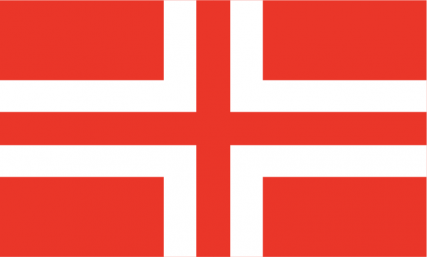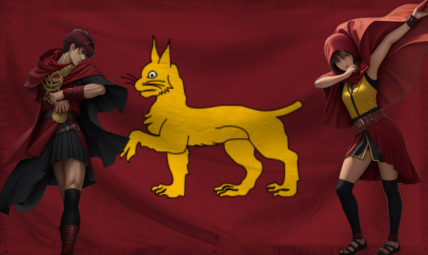

![]() by The Elyrion » Mon Dec 28, 2020 12:43 am
by The Elyrion » Mon Dec 28, 2020 12:43 am

![]() by The Palentine » Mon Dec 28, 2020 1:01 am
by The Palentine » Mon Dec 28, 2020 1:01 am



![]() by Ru- » Mon Dec 28, 2020 3:13 am
by Ru- » Mon Dec 28, 2020 3:13 am

![]() by The Elyrion » Mon Dec 28, 2020 4:51 am
by The Elyrion » Mon Dec 28, 2020 4:51 am
Ru- wrote:Ru has a constitutional monarchy, in which the monarch retains some key executive powers. The Emperor of Ru is the head of state, and joint head of government along with the Imperial Hand. Governing authority is limited, however, by the Ruvian Constitution which maintains a separation of powers between distinct legislative (The Imperial Senate) judicial (The Supreme Court of Ru) and executive (The Emperor and Imperial Hand, a nationally elected executive)
Upon coronation the Emperor swears to uphold and abide by the tenants and principles of the Ruvian Constitution, which is enforced by the Supreme Court and it's power of judicial review, and by the ability of the Imperial Senate, in conjunction with the Supreme Court, to impeach any member of the executive branch for cause, including the emperor himself.
The constitution provides the Emperor with roles both symbolic and political. He is the head of state and represents the state as well as the unity of the Ruvian people, he is the joint commander and chief of the armed forces, and the joint executive of government. Since the start of the Modern and Constitutional Eras, it has been traditionally for the Emperor to take a backseat role when it comes to politics, leaving the day to day business of governing to the realm to the Imperial Hand, Senate, and the secretaries of the Imperial Cabinet. Formal tradition expected the emperor to not even speak during decision making meetings, unless called on for input, to settle a dispute between the ministers, or break up an impasse, or in the case of critical emergencies. And the limited but key political powers of the Emperor reflect this idea of the Emperor as a sort of political referee who steps in only when necessary: The Emperor may compel the commencement of debate and even a formal recorded vote on pending legislation, allowing the emperor to bring an end to filibusters or end stalling tactics from a senate leader who refuses to bring a piece of legislation or judicial or cabinet appointment that the emperor wishes for the senate to rule on to a vote. The emperor also shares veto power with his Hand, a refusal from either to sign legislation will require a 2/3rds majority from the senate to be overridden. He may prevent the Hand from dismissing a member of cabinet without 2/3rds senate approval, object to the Hand's request to the senate for a formal declaration of war, triggering the 2/3rds override vote, or ask the senate to grant him special emergency authority for a set period of time. The Emperor is expected by the constitution and by tradition to act as a political independant at all times and is prohibited from joining any political party. The degree to which the emperor involves himself in politics or governance depends on the temperament of the individual monarch. Traditionally, since the reign of Lian IV, monarchs have shown a significant degree of restraint and disinterest outside of crises situations, but the previous two have been much more active, and the current young emperor Yoshio I, has displayed a strong curiosity and interest in politics, leaving many to speculate that he will take on an activist role when his regency ends.
Imperial succession is hereditary under the system of Male-Preference Primogeniture: The emperor's eldest son and his descendants take precedence over his siblings and their descendants. Elder sons take precedence over younger sons, all sons take precedence over daughters, and daughters take precedence over uncles and cousins. There have been considerable calls to modernize the imperial family by replacing this system with Absolute Cognatic Primogeniture, which grants female heirs the same rights of succession as males. However, the current emperor has indicated that he is not likely to consider a decision on this until he starts having children of his own. The current heir to the Imperial Throne is the Emperor's uncle, Crown Prince Niko.

![]() by Great Nortend » Mon Dec 28, 2020 5:45 am
by Great Nortend » Mon Dec 28, 2020 5:45 am

![]() by Charoskania » Mon Dec 28, 2020 9:40 am
by Charoskania » Mon Dec 28, 2020 9:40 am
Latest News: Charoskania withdraws from the IHC and founds the ACO|Government announces threat of nuclear war|Royal Family hurried to National Vault

![]() by Auzkhia » Mon Dec 28, 2020 10:10 am
by Auzkhia » Mon Dec 28, 2020 10:10 am

![]() by Yerbanistan » Mon Dec 28, 2020 10:27 am
by Yerbanistan » Mon Dec 28, 2020 10:27 am

![]() by The Union of British North America » Tue Dec 29, 2020 12:51 am
by The Union of British North America » Tue Dec 29, 2020 12:51 am

![]() by Transmaura » Tue Dec 29, 2020 6:18 am
by Transmaura » Tue Dec 29, 2020 6:18 am

![]() by Mobius and the Biscay » Tue Dec 29, 2020 10:28 am
by Mobius and the Biscay » Tue Dec 29, 2020 10:28 am

![]() by Aikoland » Tue Dec 29, 2020 12:23 pm
by Aikoland » Tue Dec 29, 2020 12:23 pm

![]() by Romextly » Tue Dec 29, 2020 12:30 pm
by Romextly » Tue Dec 29, 2020 12:30 pm

![]() by Yuzhnaslavia » Tue Dec 29, 2020 12:45 pm
by Yuzhnaslavia » Tue Dec 29, 2020 12:45 pm

![]() by Aldina » Tue Dec 29, 2020 1:52 pm
by Aldina » Tue Dec 29, 2020 1:52 pm

![]() by AquilaJordyn » Tue Dec 29, 2020 2:17 pm
by AquilaJordyn » Tue Dec 29, 2020 2:17 pm

![]() by Republica Federal de Catalunya » Tue Dec 29, 2020 6:00 pm
by Republica Federal de Catalunya » Tue Dec 29, 2020 6:00 pm

![]() by The Astrocracy » Tue Dec 29, 2020 6:10 pm
by The Astrocracy » Tue Dec 29, 2020 6:10 pm

![]() by Alzatia » Wed Dec 30, 2020 3:32 pm
by Alzatia » Wed Dec 30, 2020 3:32 pm

![]() by Ahkara » Wed Dec 30, 2020 5:02 pm
by Ahkara » Wed Dec 30, 2020 5:02 pm

![]() by Vallermoore » Wed Dec 30, 2020 6:38 pm
by Vallermoore » Wed Dec 30, 2020 6:38 pm

![]() by Mandicoria » Wed Dec 30, 2020 6:42 pm
by Mandicoria » Wed Dec 30, 2020 6:42 pm

![]() by Jershaland » Wed Dec 30, 2020 6:50 pm
by Jershaland » Wed Dec 30, 2020 6:50 pm

![]() by Diarcesia » Wed Dec 30, 2020 7:31 pm
by Diarcesia » Wed Dec 30, 2020 7:31 pm

![]() by Tsarus 2142 » Wed Dec 30, 2020 7:36 pm
by Tsarus 2142 » Wed Dec 30, 2020 7:36 pm
Advertisement
Return to Factbooks and National Information
Users browsing this forum: Lehpuhrta, Thermodolia
Advertisement